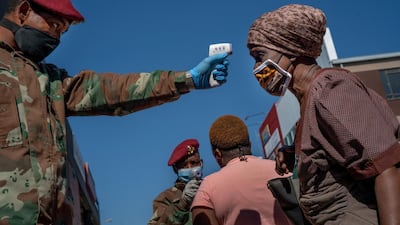Africa has so far been spared the worst impact of the coronavirus, but the World Health Organisation is worried the continent could face a "silent epidemic" if its leaders do not prioritise testing for it, a WHO envoy said on Monday.
"My first point for Africa, my first concern, is that a lack of testing is leading to a silent epidemic in Africa. So we must continue to push leaders to prioritise testing," special envoy Samba Sow told a news conference.
The WHO's director general, Tedros Adhanom Ghebreyesus, said Africa was the region with the fewest diagnosed coronavirus cases, accounting for less than 1.5 per cent of the global total and just 0.1 per cent of deaths.
The WHO regional director for Africa, Matshidiso Moeti, said some countries had taken measures to curb the disease at a high economic cost. Those measures meant the pandemic was having a milder impact so far than some models had predicted, Dr Moeti said.
Dr Tedros credited the continent's experience dealing with other epidemics as helping it scale up its response to the coronavirus and be spared the impact seen elsewhere so far.
All African countries had preparedness plans in place, he said, although there were still "gaps and vulnerabilities".
Testing in Africa remains low. The Africa CDC has said the continent needs to increase testing about 10-fold. It should strive to test at least 1 per cent of the population, or 13 million people, but so far about 1.5 million tests have been conducted. Shortages of equipment remain a problem.
South Africa has been testing assertively and leads the continent with more than 19,000 cases.
The situation across the continent remains quite varied, the WHO emergencies chief, Mike Ryan, told reporters Friday, as cases surpassed 100,000. In the past week, four African countries had an increase in virus cases of over 100 per cent.
He noted Africa’s young population, median age under 20, but said it “doesn’t in any way reduce the chance the disease will spread.” And no one knows what impact the virus will have on millions of undernourished people and overcrowded refugee camps. “So there’s still a lot to be learned.”
Countries with fragile health systems and a recent history of conflict like Somalia and South Sudan remain a worry for health officials as cases rise. And in Tanzania, where the president claims the virus has been defeated by prayer, the government hasn’t updated its case numbers in three weeks.













